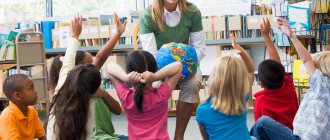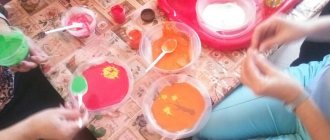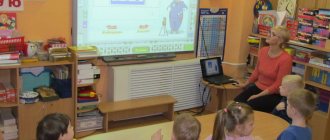Master class as an effective form of working with parents in preschool settings
Master class as an effective form of working with parents in preschool settings
Master class as an effective form of working with parents in preschool settings
Master class as an effective form of working with parents in preschool settings from work experience
In accordance with the Federal State Educational Standard for Preschool Education, one of the main tasks facing a preschool organization is: “Providing psychological and pedagogical support for the family and increasing the competence of parents (legal representatives)
in matters of development and education, protection and promotion of children’s health” In this regard, the position of the kindergarten in
working with families
, and the need arises for the active inclusion
of parents in the life of the preschool educational institution
.
The question arises: How to interest parents in working together
?One of the ways to solve this issue is to search for new
forms
of interaction with the families of pupils.
The basis of the interaction between kindergarten and family is cooperation between teachers and parents
, which presupposes equality of positions and respectful attitude towards each other.
Full education and development of preschool children occurs only under the condition
close cooperation and interaction between family and preschool organization.
Therefore, teachers are increasingly using new forms in their work.
with the families of the pupils.
One of the effective forms of interaction with parents
is to conduct
master classes
.
This form of work
allows you to realize the need to establish mutual understanding between teachers and
parents in the space of a preschool educational institution
, allows you to exchange emotions, knowledge, and experience.
The main advantages of the master
class are a unique combination:
short theoretical part,
individual work
,
aimed at acquiring
consolidation of practical knowledge and skills.
Master
-class is an opportunity to get acquainted with new technology, new techniques and proprietary
developments
.
Master class is a special form
, which is based on
the “practical”
actions of showing and demonstrating a creative solution to a specific cognitive and problematic pedagogical task.
I will go into more detail about using the wizard
-classes as an active
form of interaction with parents
in matters of artistic and aesthetic development of preschool children
Any child can become a creative person. To raise a talented person, it is necessary to develop in children in preschool childhood creative thinking, the ability to think outside the box.
Effective
A method for developing children's creative abilities is to introduce not only them, but also their
parents,
to unconventional drawing techniques, various materials, and interesting techniques used in artistic creativity.
Summary of consultation for teachers “How to conduct a master class correctly”
Irina Gridchina
Summary of consultation for teachers “How to conduct a master class correctly”
(Slide 2)
A master class is an open pedagogical system , with the help of which teachers convey new opportunities for teaching practice . This is an up-to-date form for generalizing and disseminating innovative pedagogical experience . Its peculiarity lies in the fact that it is based on the practical actions of the teacher and includes a creative solution to a cognitive task or problem situation.
In methodological work, the master class occupies a leading place. Master classes are very popular , where teachers have the opportunity to learn the technology of making a product and obtain it themselves. This makes this methodological form attractive for educators.
Key rules for conducting a master class
A master class is a methodological innovative form. At the heart of any master class is the personality of an innovative teacher , who is characterized by new thinking and his own view on a topic or problem.
During the master class, teachers get acquainted with a specific technology or methodology prepared by the master teacher . At the beginning of the master class, he creates a problematic motivating situation that stimulates participants to further complete tasks and arouses their interest.
Any master class should consist of tasks that direct the participants’ activities to achieve the goal. But within each task, the participants are absolutely free. They independently choose the path of research, the means and methods to achieve the goal, the pace of work, look for answers to problematic questions, and draw conclusions. At the same time, the master teacher provides them with methodological materials and developments for further independent activities.
As a result of the master class, teachers jointly master a new technology or methodology and create their own product.
The master teacher must provide an interactive form of communication during the master class , i.e., give the participants the opportunity to practically get acquainted with the proposed technology and techniques.
Thus, during the master class there is no need to impart new knowledge to the participants. They gain knowledge or skills themselves with the help of all participants in the event.
Each teacher should have the opportunity to express their own opinion, indicate their position and offer an independent solution to the problem stated in the master class . This approach is interactive.
The master class has a certain structure: (Slide 3)
• theoretical part;
• display or demonstration of process technology;
• practical part – creating a product;
• product presentation (advertising)
;
• conclusions (reflection)
.
Based on the structure of the master class, for conducting it is built . (Slide 4)
According to him,
a master teacher :
• defines tasks, formulates a problem situation;
• introduces the technology to the participants of the master class ;
• forms working creative groups;
• organizes independent practical work of teachers with materials ;
• invites teachers to present and discuss the results of their work.
The most crucial moment is thorough preparation for the master class , which is also carried out in several stages.
I suggest that you think about the arrangement of tables and chairs for practical work in advance. There are many ways to accommodate master class , depending on the goals and form of behavior. (Slide 5 -
An example of preparing and conducting a master class
Let's consider one of the options for preparing and conducting a master class .
This will be a master class to familiarize teachers with the technology of making laptops.
The structure of the event includes three parts: general organizational (theoretical aspects, basic practical (work of participants in separate workshops )
and final
(presentation of the resulting products)
.
PLAN FOR THE MASTER CLASS “Using laptops in working with preschool children”
• A story about the types of laptops and the possibilities of their use.
• Creation of creative groups and distribution of work topics
• Practical part ( workshops )
- creation of laptops.
• Presentation of laptops
• Discussion and exchange of opinions.
the master class preparation stage, an initiative group is formed. It may include methodologists or senior educators, educators who are proficient in practical technologies and act as master teachers , and proactive parents.
The initiative group determines the topic and number of workshops , resolves organizational issues: prepares the premises, necessary equipment and materials, prepares presentations.
After determining the goal and stages of practical work, the participants are divided into creative groups of 3–4 people. In the workshops , they determine the shape of their laptop and make it themselves.
At the final stage - the advertising stage - the participants of the master class demonstrate the printed laptops and offer options for their use in educational activities.
The goal of such practical master classes is not just to make a product, but to think through its subsequent use in gaming, educational research and other types of activities.
Making laptops is a fun activity. A teacher who has perfectly mastered this technique can not only make them himself, but also involve children and their parents in the work. A laptop can be used both to study any subject or phenomenon, but also to consolidate knowledge on a given topic. A child can work with a laptop either independently or in a group of peers. Creating a laptop can be a great way to complete any project.
Algorithm for preparing a master class for teachers
1. Determine the topic of the master class . It should be interesting and exciting and reflect the problem you are working on. Participants in the master class must know in advance what they will be shown. The topic of the master class can be anything - creative productive activity, modern educational technology, non-traditional pedagogical techniques , original forms of organizing educational activities, effective use of technical teaching aids, etc. It can contain the basics of education for preschool children and be designed for young teachers . In this case, try to find a non-standard move or alternative points of view.
2. Gather information on the topic. Even if you are fluent in practice, be sure to study the theoretical side of the issue. This will help you answer in detail any question from a master class about the stated problem.
3. Formulate the purpose of the master class . Ask yourself what result you want to achieve, what the master class .
4. Define tasks. They will help you achieve your goal.
5. Highlight a problem or question that is of interest to the audience and will introduce participants to the topic of the master class .
6. Determine the form of the master class . Think about what technique you can use to interest your audience. Modern pedagogy allows for different techniques. The more vivid and unexpected they are, the sooner you will achieve your goal. However, the master class must be methodologically sound. Therefore, be able to justify why you are using this particular technique.
7. Prepare the necessary equipment. Equipment, visual aids and materials should illustrate the main directions and important stages of your work. Prepare an exhibition, make several manuals that will demonstrate the process at its different stages. This could be a computer presentation or a video. Think and decide what supplies participants should bring with them.
8. Make a plan for the master class . Without it, you may miss or confuse something. Based on the information you have collected, create a structure for your workshop . Write it down point by point and indicate the approximate time needed to complete each step. Leave some time for unforeseen circumstances and deviations from the topic, answering questions from participants.
9. Prepare a sample text that you will pronounce at the master class . There is no need to memorize it, but you can say it several times in front of a mirror or in front of colleagues. This will allow you to feel more confident and hear possible errors in the content of the speech. Write down the main points on a piece of paper and take them with you.
10. Prepare the final part of the master class . At the end of the presentation, do not forget to praise all participants and discuss the results. Highlight the merits of each work. Tell participants how they can use the workshop .
Master class for preschool teachers. Educational technology "Children's Council"
Master class for kindergarten teachers “Educational technology “Children’s Council” as a condition for the individualization of children.”
Author: Irina Vyacheslavovna Makarova, teacher of MBDOU No. 23 “Golden Cockerel”. This master class will be useful for preschool teachers, students of pedagogical faculties, and parents. Goal: to search for new forms of work and ways to use the “children’s council” technology in a preschool organization in the conditions of the Federal State Educational Institution. Plan of the master class: 1. Introductory speech; 2. Practical game exercises; 3. Summing up, exchange of opinions. Number of participants: up to 10 people. Duration: up to 20 minutes. Progress of the master class: Today, in connection with the introduction of the Federal State Educational Standard in preschool education, each of us, a teacher standing at the origins of childhood, needs to clearly understand that in our hands is the most valuable thing in a person’s life - a child.
One of the main components of a teacher’s pedagogical competence, in my opinion, is respect and recognition of the student’s personality and support for children’s uniqueness. The future development of a preschool child depends on how much we adults are guided by this. The educational technology “Children's Council” is designed to help teachers with this. Dear colleagues, how many of you are familiar with and work with this technology? I think you will agree with me that the children's council is the place and time for business and spiritual communication between adults and children, which sets the meaning of the entire life of the group. The purpose of the children's council is to unite children and adults around events, joint affairs, and actions. The Children's Council does not have a specific structure. For ourselves, we have identified some semantic parts: greetings, communication games, news exchange, philosophizing. In a joint dialogue, we discuss thoughts, ideas and plans, draw up an activity plan, determine who will do what, and in accordance with the choice, the children are distributed among activity centers. This form of interaction presupposes the active participation of children in discussing problems and making decisions, organizing educational activities based on the free, conscious and responsible choice by children of the content of their education. So, the Children's Council involves a general meeting of a group of children together with teachers. Everyone gets the opportunity to talk about events in their lives, describe their experiences, share desires, and receive new information from others. At the initiative of children and adults, upcoming classes are planned, group rules are established, and various games and exercises are conducted. I invite colleagues to participate in the master class and propose to unite in two groups. In order to understand what children's advice is, it is necessary to determine for yourself an understanding of this form of interaction. I present to your attention the following exercises: “CONTINUE THE SENTENCE” For the first group of participants: •Children’s council is…. (your answer options). For the second group of participants: •Children's council does not... Time to complete the task is 3 minutes. And I will ask you, dear audience, to answer the following question: “A MODERN PRESCHOOL CHILD, WHAT IS HE WHAT IS HE? WHAT QUALITIES DOES HE HAVE? •curious, interested, actively exploring the world; •capable of organizing their own activities; •benevolent, able to listen and hear his partner, respecting his own and others’ opinions; •ready to act independently and be responsible for their actions. Thus, we have a portrait of a modern preschooler. Now let's go back to our groups and listen to what they did. Children's advice is...
-choice; -participation; -complicity; -news; -initiative; -cooperation; -discussion; -interaction; -life creativity; -communication; -assistance; -planning; -activity; -communication; -Union.
Children's advice is not...
-class;
-educational activities; -has regulations; -has uniform rules; - obligatory participation; -compulsion; -has structures; - educational and training activities; - single share. Despite all the apparent simplicity of holding a children's council, I want to say that problematic situations often arise and they cannot always be resolved quickly and masterfully. I suggest that my colleagues do this now. “WHAT TO DO IF...” We work in groups. Task for the first group: 1. If the child chooses nothing during joint planning. What should I do? Task for the second group: 2. If the child chooses the same center. What should I do? Work schedule: 3 minutes. While the groups are preparing, let's talk some more about it. Please come up with a proposal using the abbreviation GEF. Our version: The philosophy of genius is the basis of meaning. Let's return to the tasks of our groups and listen to their answers. 1. If the child chooses nothing during joint planning. What should I do? •After most of the children have made their choice, repeat again to the remaining children what materials are available in the activity centers, name possible actions if necessary, wait a minute and repeat their decision. •Invite a child who is at a loss to choose to join your work. •Offer him (if the child is psychologically ready to cooperate with you) a game of scouts (aliens, journalists), during which he will have to go around all the centers of activity and tell you about what interesting things the children are doing. It is important here not to give in to negative statements (they don’t do anything, they play around). Keep your child in this role for several days: “And there is a special task for you - you will again be like a scout,” and perhaps soon you will notice his desire to make his own choice. 2. If the child chooses the same center. What should I do? •If a child is enthusiastic, do not disturb him. •If it is necessary to change a sedentary state, offer to move around and carry out an important task. •If there is no dynamics in the child’s actions, offer variety with additions that are attractive to the child. •“Close” the center for a while, citing a ban. I suggest you answer the question: DO YOU SEE PARENTS PARTICIPATING IN THE CHILDREN'S COUNCIL? IF SO, WHAT IS THEIR ROLE? For both groups. While the groups are preparing, I propose to perform a practical task for the audience. Express your attitude towards the children's advice, if your attitude towards this technology is positive, then put the pebble in a jar with a cheerful smiley face, if your attitude is neutral or dubious, then put it in a jar with a sad smiley face. After the participants' responses, I will summarize. A parent is an active, voluntary, equal participant. Interaction with parents in the children's council: •We invite you at a time convenient for parents. •We wonder if our help is needed. •We create instructions for parents about what and how to do in activity centers. •We encourage parents, but do not ask unnecessary questions and do not interfere. •We openly and sincerely thank them and involve them in discussing the lives of children in the group. I want to thank my colleagues for their work in the master class and give them booklets. Reflection. The result with jars. Whether or not to use this form of interaction with children is up to you, dear colleagues! But I would like the Children's Council to take place. Because... •Knowledge of one’s rights and responsibilities, the ability to freely express one’s opinion is one of the indicators of a socially developed personality. •The participation of every child in decisions affecting his interests is of particular importance for achieving social justice and social inclusion, for equality of opportunity. •The child's right to be heard and taken seriously is one of the basic values of life. I would like to draw attention to the last phrase: The child’s right to be heard and taken seriously is one of the basic values of life. At the end of our meeting, I want to tell a parable. A long time ago, in an ancient city there lived a Master, surrounded by disciples. The most capable of them once thought: “Is there a question that our Master could not answer? “He went to a flowering meadow, caught the most beautiful butterfly and hid it between his palms. The butterfly clung to his hands with its paws, and the student was ticklish. Smiling, he approached the Master and asked: “Tell me, what kind of butterfly is in my hands: alive or dead?” He held the butterfly tightly in his closed palms and was ready at any moment to squeeze them for the sake of his truth. Without looking at the student’s hands, the Master answered: “Everything is in your hands.” Our skill, dear colleagues, determines how a child will emerge from kindergarten: and I believe that he will be a creative, inquisitive, thoughtful person, ready to consciously make choices and be responsible for them. All in our hands! Thank you for your attention and cooperation!
We recommend watching:
Development of communication skills of children 5-7 years old in theatrical activities Spiritual and moral education of preschool children Introducing preschool children 5-7 years old to Russian folk culture Lesson notes for preschoolers. Memorizing Serov's poem "Snowdrop"
Similar articles:
Methods of conducting physical education classes in kindergarten
Morning exercises in the preparatory group in a playful way
Teasing games for children 5-6 years old
Dance festival in kindergarten for children 5-7 years old. Scenario
Outdoor games as a means of harmonious development of a child





